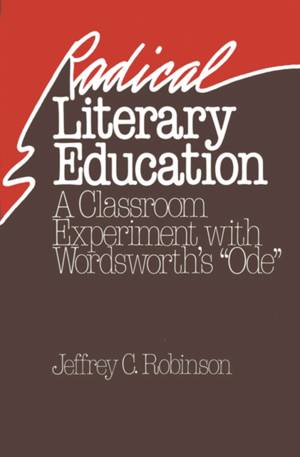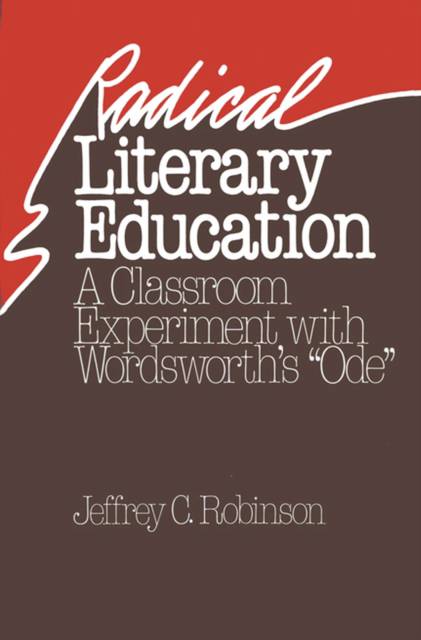
Je cadeautjes zeker op tijd in huis hebben voor de feestdagen? Kom langs in onze winkels en vind het perfecte geschenk!
- Afhalen na 1 uur in een winkel met voorraad
- Gratis thuislevering in België vanaf € 30
- Ruim aanbod met 7 miljoen producten
Je cadeautjes zeker op tijd in huis hebben voor de feestdagen? Kom langs in onze winkels en vind het perfecte geschenk!
- Afhalen na 1 uur in een winkel met voorraad
- Gratis thuislevering in België vanaf € 30
- Ruim aanbod met 7 miljoen producten
Zoeken
Radical Literary Education
Classroom Experiment with Wordsworth's ""Ode
Jeffrey Robinson, Robert Peters
Paperback | Engels
€ 22,45
+ 44 punten
Omschrijving
The poem in the college classroom usually appears as an autonomous object to be dissected, thus revealing its internal relations--image patterns, meter and rhyme schemes, and types of figurative language. Jeffrey C. Robinson, a college teacher for many years, believes that there is a better way to teach poetry. His conviction, developed over many years and acted upon in his own classroom, has led to a pedagogy that urges the teaching of each poem by examining it in its various contexts. The result, as expressed in this book, is a moving exploration of the relationships among scholarship, teaching, and learning, of critical importance to all teachers of literature, as well as to those concerned with educational theory.
Robinson demonstrates his pedagogy with a case study--the teaching of Wordsworth's "Ode: Intimations of Immortality from Recollections of Early Childhood." He interprets the students' fascinating and moving confusions and discoveries as the "Ode" loses its consoling aura and as their thinking takes a correspondingly more energetic, critical, and self-reflective turn.
As a teacher, the author--whose muted autobiography itself enriches the context--has had his own concerns to which this book provides some answers: How would a prolonged encounter with one poem significantly alter students' learning? Would the poem, seen in its social relations, become less an object of worship and more an occasion for the students' own exploration of the place of art in society and in their own education? This book has emerged out of these questions. As well as being a full rehearsal of the actual literary and historical contexts of Wordsworth's "Ode," it is a meditation on the sociology of literary education and necessarily the learning apparatus of the late adolescent.
Robinson demonstrates his pedagogy with a case study--the teaching of Wordsworth's "Ode: Intimations of Immortality from Recollections of Early Childhood." He interprets the students' fascinating and moving confusions and discoveries as the "Ode" loses its consoling aura and as their thinking takes a correspondingly more energetic, critical, and self-reflective turn.
As a teacher, the author--whose muted autobiography itself enriches the context--has had his own concerns to which this book provides some answers: How would a prolonged encounter with one poem significantly alter students' learning? Would the poem, seen in its social relations, become less an object of worship and more an occasion for the students' own exploration of the place of art in society and in their own education? This book has emerged out of these questions. As well as being a full rehearsal of the actual literary and historical contexts of Wordsworth's "Ode," it is a meditation on the sociology of literary education and necessarily the learning apparatus of the late adolescent.
Specificaties
Betrokkenen
- Auteur(s):
- Uitgeverij:
Inhoud
- Aantal bladzijden:
- 204
- Taal:
- Engels
Eigenschappen
- Productcode (EAN):
- 9780299110642
- Verschijningsdatum:
- 15/07/1995
- Uitvoering:
- Paperback
- Formaat:
- Trade paperback (VS)
- Afmetingen:
- 141 mm x 217 mm
- Gewicht:
- 263 g

Alleen bij Standaard Boekhandel
+ 44 punten op je klantenkaart van Standaard Boekhandel
Beoordelingen
We publiceren alleen reviews die voldoen aan de voorwaarden voor reviews. Bekijk onze voorwaarden voor reviews.









